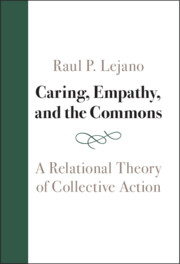Book contents
- Caring, Empathy, and the Commons
- Caring, Empathy, and the Commons
- Copyright page
- Contents
- Figures
- Tables
- Preface and Acknowledgments
- 1 Introduction
- 2 Constructing a Relational Theory of Collective Action
- 3 Further Justifications of the Relational Theory
- 4 Connectedness and Pro-Social/Pro-Environmental Behavior
- 5 Illustrations
- 6 Institutional Considerations
- 7 Prospects of Relationality
- References
- Index
6 - Institutional Considerations
Published online by Cambridge University Press: 17 August 2023
- Caring, Empathy, and the Commons
- Caring, Empathy, and the Commons
- Copyright page
- Contents
- Figures
- Tables
- Preface and Acknowledgments
- 1 Introduction
- 2 Constructing a Relational Theory of Collective Action
- 3 Further Justifications of the Relational Theory
- 4 Connectedness and Pro-Social/Pro-Environmental Behavior
- 5 Illustrations
- 6 Institutional Considerations
- 7 Prospects of Relationality
- References
- Index
Summary
The chapter begins with Bourdieus analogy of gift giving (among the Kabyle). Focusing on relationality and the consequences of connectedness leads to principles for designing institutions. The idea is that fostering connections between individuals and groups increases mutual identification, which triggers a sense of care. Information-based strategies for environmental (and other) regulation can be guided by these principles, including that of building into the institution connections with those being affected or helped by the action. These connectivities can take advantage of new media that allow direct access to the images, voice, and face-to-face contact from the field. Many of the design principles have to do with building social networks and allowing deeper and sustained relationships across boundaries, bringing together those who normally would be disconnected. Relational principles complement those for common-pool resources and are not an alternative to them. While common-pool resource theory emphasizes the need to establish formal boundaries and rules of use, the relational theory aims to increase connectedness and foster caring.
- Type
- Chapter
- Information
- Caring, Empathy, and the CommonsA Relational Theory of Collective Action, pp. 93 - 108Publisher: Cambridge University PressPrint publication year: 2023



